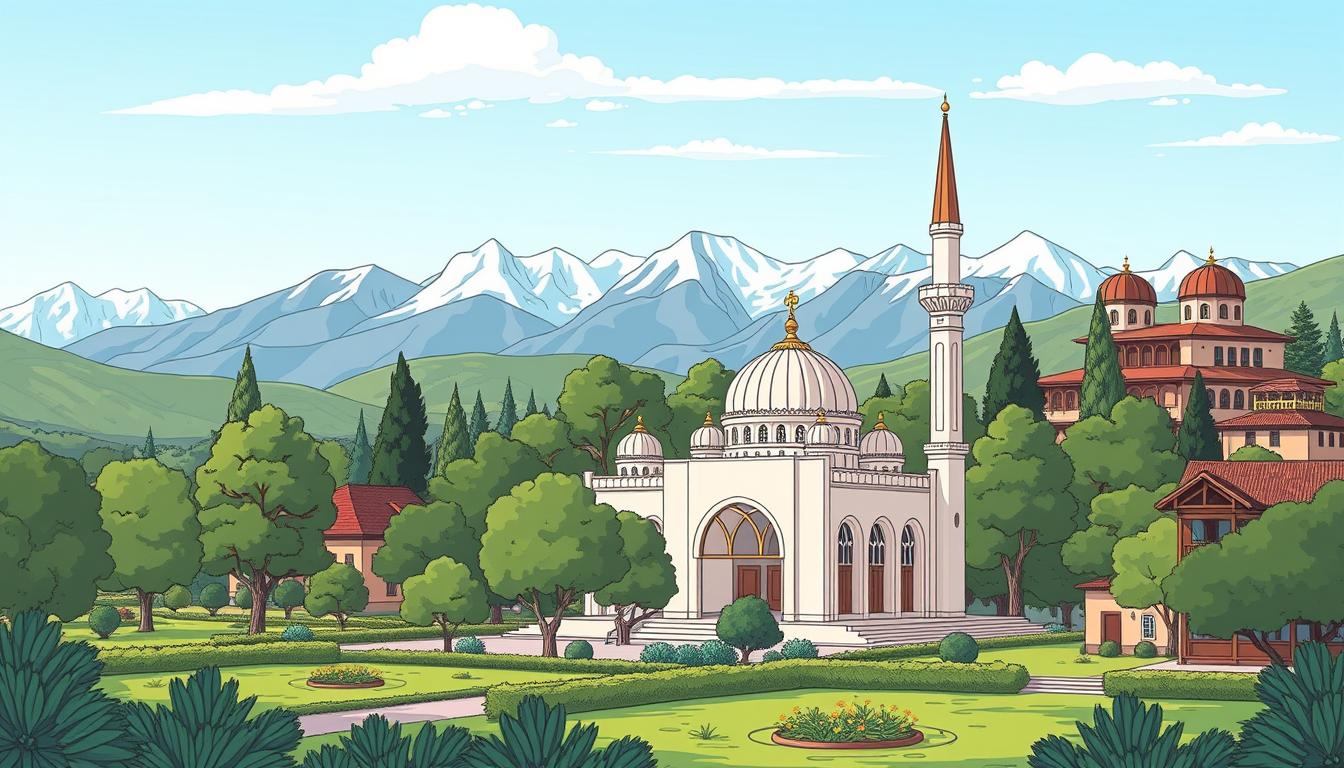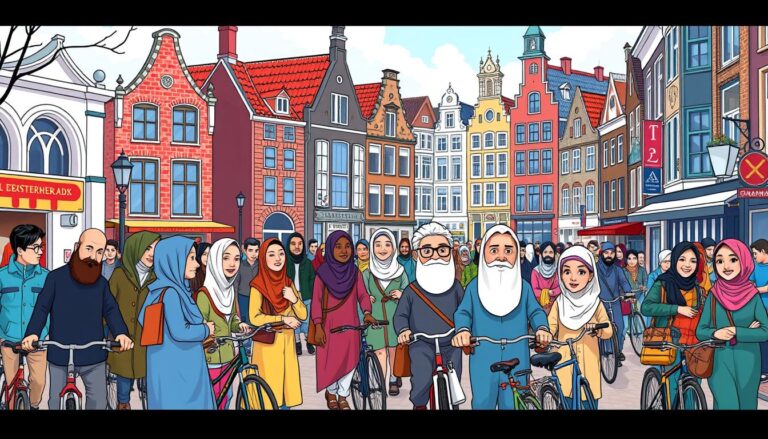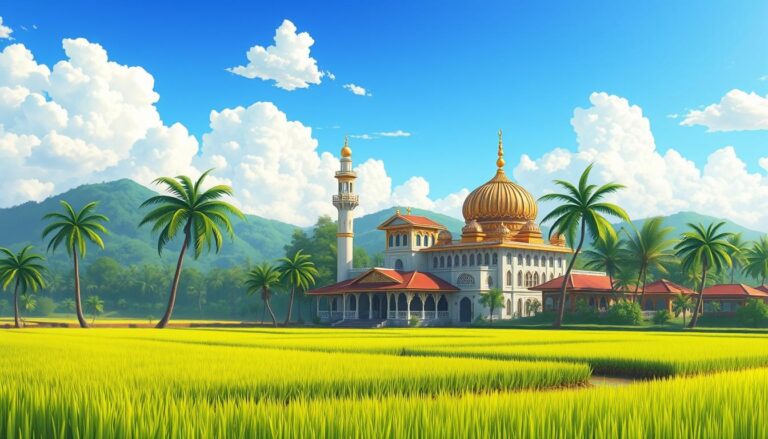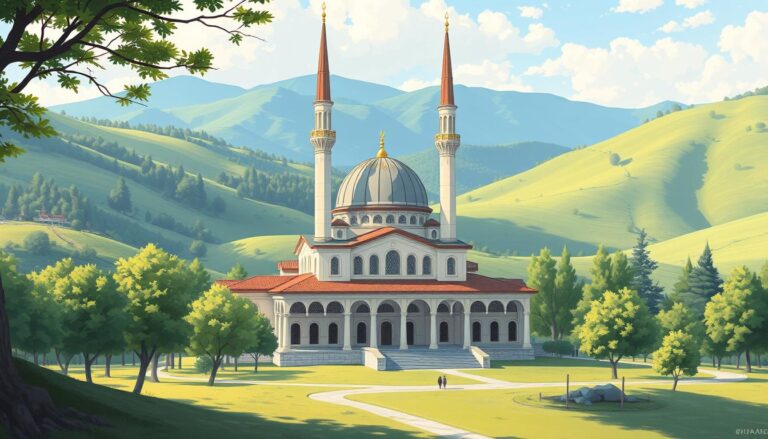Islam in Chile
While Chile is widely known as a predominantly Catholic country, the presence of Islam in the Andean nation is a story that often goes untold. With an estimated Muslim population of just 5,000 – representing less than 0.02% of the total population – the Islamic community in Chile is a small but vibrant part of the country’s diverse religious landscape.
From the early Lebanese, Syrian, and Palestinian immigrants who laid the foundations of Chile’s Muslim population in the 19th and 20th centuries to the more recent waves of migration and conversion, the history of Islam in Chile is one of resilience and adaptability. Today, the country boasts over 13 mosques and Islamic centers, each serving as a hub for religious, cultural, and social activities within their respective communities.
Key Takeaways
- The Muslim population in Chile is estimated to be around 5,000, representing less than 0.02% of the total population.
- Chile’s Islamic community has its roots in 19th and 20th century migrations from the Levant region.
- The country has over 13 mosques and Islamic centers, serving as hubs for the Muslim community.
- Islamic organizations in Chile include the Muslim Society of Chile, the Islamic Association of Chile, and the Islamic Foundation of Chile.
- The Mezquita as-Salaam mosque in Santiago is considered the heart of the city’s Muslim community.
Historical Origins of Islam in Chile
The history of Islam in Chile can be traced back to the early settlers who arrived in the country centuries ago. According to chronicles, there was a man named Pedro de Gasco in the expedition of discoverer Diego de Almagro who was a morisco, or a Muslim from Spain forced to convert to Catholicism. This early Moorish heritage has had a lasting impact on the development of Chilean culture and identity.
The first major wave of Muslim immigration to Chile occurred in 1856, with the arrival of Arab settlers from the Ottoman Empire territories, which today comprise modern-day Syria, Lebanon, and Palestine. These early Muslim settlers laid the foundation for the Islamic presence in the country, establishing communities and contributing to the diverse cultural tapestry of Chile.
“The coming of moriscos was covered by history, but recently scholars of Chilean history have started acknowledging the country’s Moorish heritage and its effects on the development of Chilean culture and identity.”
By 1907, the Muslim population in Chile had reached 1,498 individuals, primarily consisting of foreign-born residents. Over the following decades, the Muslim community in Chile fluctuated, with the population decreasing to 402 in 1920 before gradually increasing to 956 by 1952. Today, the Muslim population in Chile is estimated to be around 3,000, with many Chileans having converted to Islam and actively participating in the country’s Islamic practices and institutions.
Waves of Immigration from the Ottoman Empire
The history of Muslim immigration to Chile is closely intertwined with the waves of migration from the Ottoman Empire. As early as the 1885 census, the number of “Turks” had risen to 29, though their exact origin and religious affiliation were not recorded. However, by the 1895 census, the presence of 76 “Turks” was documented, with 58 of them identified as Muslims, primarily concentrated in the northern regions of Chile, including Tarapacá, Atacama, Valparaiso, and Santiago.
The Muslim population in Chile continued to grow, and by the 1907 census, it had reached 1,498 individuals, all of them foreigners. This represented 1,183 men and 315 women, accounting for 0.04 percent of the total population, which was the highest percentage of Muslims in Chile’s history.
“The first wave of Middle Eastern migration to Latin America lasted from the 1860s through 1914 and saw about 600,000 Arabic speakers from the Levant resettling in the Americas.”
The waves of immigration from the Ottoman Empire to Chile were driven by a variety of factors, including the worsening conditions within the empire and the search for better economic opportunities. These Arab immigrants, often from the Levant region, sought to integrate quickly into their new communities, while maintaining strong connections to their cultural heritage.
The presence of these Arab immigrants in Chile has left a lasting impact, with the Palestinian-Chilean community playing a significant role in the country’s political landscape, uniting around the Palestinian cause. The Arab-Latin American diaspora, however, has also faced challenges in preserving their cultural identity, with subsequent generations often forgetting their origins over time.
Islamic Organizations and Institutions
Chile’s Muslim community has a rich history of Islamic organizations and institutions that have played a pivotal role in preserving and promoting the faith. At the forefront of these initiatives is the Muslim Society of Chile, the first Islamic institution established in the country.
Muslim Society of Chile and As-Salam Mosque
The Muslim Society of Chile (Sociedad Unión Musulmana) was founded in Santiago on September 25, 1926. This pioneering organization was instrumental in the construction of the iconic As-Salam Mosque (Mezquita As-Salam), which began in 1988 under the guidance of Sheikh Taufiq Rumie’ and was completed in 1989.
Other Notable Mosques and Islamic Centers
Beyond the As-Salam Mosque, Chile is home to several other notable Islamic institutions, including the Bilal Mosque (Mezquita Bilal) in Iquique, the Mohammed VI Cultural Center (Centro Cultural Mohammed VI) in Coquimbo, and the Islamic Foundation of Chile in Santiago.
These mosques and Islamic centers serve as hubs for the Muslim community, providing spaces for worship, education, and community gatherings. They play a vital role in fostering a sense of identity and belonging among Chilean Muslims.
Demographics and Population
The Muslim population in Chile is a small but noteworthy part of the country’s diverse religious landscape. According to the latest census figures from 2002, there were a total of 2,894 Muslims living in Chile, accounting for just 0.03% of the population over 15 years old. Interestingly, 66% of these Muslim residents were men.
The demographics of Muslims in Chile have fluctuated over the decades. A previous census in 1992 did not even include Islam as an alternative, indicating the community’s relative obscurity at the time. By 1920, the number of Muslims had decreased to 402, with 343 men and 59 women. The greatest concentrations were in the provinces of Santiago and Antofagasta, with 76 Muslims each.
However, the Muslim population in Chile saw a resurgence in the mid-20th century. The 1952 census showed the number of Muslims had risen again to 956, with the majority residing in Santiago and the rest scattered throughout the provinces.
“The Muslim population in Chile is a small but noteworthy part of the country’s diverse religious landscape.”
While the Muslim population in Chile and the demographics of Muslims in Chile have fluctuated over time, the community continues to maintain a presence in the country, contributing to its rich cultural tapestry.
Islam in Chile
Islam in Chile is a fascinating story of resilience and adaptation. The Muslim presence in this South American nation can be traced back to the 19th and early 20th centuries, when waves of immigrants from the Levant region – primarily Lebanon, Syria, and Palestine – arrived as refugees fleeing the Ottoman Empire.
These Levantine immigrants and their descendants established the first Islamic institutions in Chile during the 1920s. Despite their diverse national and religious backgrounds, the early Muslim community in Chile came together as one, laying the foundation for Islam’s growth in the country.
Today, almost a century after the first Islamic center was built, Chile boasts over 13 mosques and Islamic centers. While Muslims make up a small fraction of the population, their influence and contributions to the nation’s cultural tapestry are undeniable.
The Muslim presence in Chile is part of the country’s rich religious diversity. According to a 2023 AmericasBarometer survey, nearly 40% of the Chilean population is unaffiliated, making it the second least religious country in Latin America after Uruguay. The 2002 census revealed that indigenous people, who make up 5% of the population, were predominantly Catholic, evangelical, or “others.”
A 2022 report indicated that the religious affiliations in Chile were 88% Christian (mainly Catholic), 0.15% Baha’i, 0.1% Jewish, 0.1% Muslim, and 10% non-religious. The changing religious demographics in the country are evident, with a decline in the importance of religion in people’s lives from 46% in 2007 to 27% in 2015, according to the UC-Adimark Bicentennial Survey.
Despite the small Muslim presence in Chile, the community continues to thrive and contribute to the nation’s diversity. The story of Islam in Chile is one of resilience, adaptation, and the enduring power of faith in a changing world.
Diverse Muslim Communities
Chile’s Muslim population, estimated around 5,000, is a diverse tapestry of Sunni and Shia adherents. These two distinct groups have established their own mosques and centers, serving as communal hubs for the Muslim minority in Chile.
Sunni Muslims in Chile
The largest Muslim community in Chile is tied to the Mezquita as-Salaam mosque in Santiago. This mosque is currently managed by the Tablighi Jamaat, a global Muslim missionary movement. Sunni Muslims make up the majority of Chile’s Muslim population and find their spiritual and cultural home at this central institution.
Shia Muslims in Chile
Shia Muslims have also established a presence in Chile, with many tracing their roots back to the 19th century. The Centro de Cultura Islámica in Santiago serves as the primary gathering place for the Shia community, providing a space for worship, education, and community building.
The Muslim diversity in Chile is a testament to the rich tapestry of Islamic traditions that have taken root in this South American nation. Both Sunni Muslims in Chile and Shia Muslims in Chile continue to contribute to the cultural and religious landscape, maintaining their distinct identities while coexisting within the broader Chilean society.
Mezquita as-Salaam: The Heart of Santiago’s Muslim Community
Established in 1989, the Mezquita as-Salaam mosque in Santiago is the cornerstone of the city’s vibrant Muslim community. Open daily for ritual prayers, this sacred space also hosts all Islamic events, including nightly feasts during Ramadan and communal meals for the festival of Eid.
The mosque is currently managed by the Tablighi Jamaat, a global Muslim missionary movement. This organization provides most of the Islamic instruction and delivers the main lectures in both Spanish and Arabic for the Friday prayer service. The Tablighi Jamaat also sends Chile’s Muslim converts abroad for Islamic learning and takes them on religious excursions throughout Latin America as part of their mission to remind Muslims to adhere to traditional Islamic practices.
“The Mezquita as-Salaam is more than just a place of worship – it’s the beating heart of Santiago’s Muslim community, where we come together to celebrate our faith and culture.”
– Fatima Gomez, long-time worshipper at the Mezquita as-Salaam
With its striking architecture and welcoming atmosphere, the Mezquita as-Salaam has become a significant landmark for the Muslim community in Santiago. It serves as a hub for Islamic practices in Chile, fostering a sense of belonging and preserving the rich heritage of the Muslim faith in the region.
Converts to Islam in Chile
Among the diverse Muslim communities in Chile, many are native converts who have embraced Islam in recent years. One such individual is Khadija, who discovered Islam through her own online research and came to the Mezquita as-Salaam mosque in Santiago only after deciding to join the faith.
Khadija does not identify with the approach of the Tablighi Jamaat, a Muslim missionary movement, and instead prefers to participate in study circles with other Chilean converts and Arab Muslim women who attend the mosque. Together, they practice Quranic recitation, study the Quran and hadith, discuss the ethics of Islam, and share ideas for halal recipes.
The Muslim convert experience in Chile is a testament to the growing interest in Islam among the local population. These Chilean Muslim experiences showcase the personal journeys of individuals like Khadija, who have embraced Islam in Chile and found a sense of community and spiritual fulfillment within the Muslim converts in Chile.
“I found Islam through my own research and exploration. It wasn’t through any particular group or organization, but rather a personal discovery that resonated with me deeply.”
Khadija’s story reflects the diverse pathways that have led some Chileans to embrace the Muslim faith. As the Muslim convert in Chile community continues to grow, their experiences offer a unique insight into the evolving religious landscape of the country.
The Naqshbandi Sufi Order in Chile
Nestled in a working-class area of Santiago, the center of the Naqshbandi Haqqani Sufis, a global Sufi order originating from Central Asia, stands as a beacon of spiritual practice for a community of predominantly Muslim converts in Chile. Led by a local Chilean sheikh, this tight-knit group regularly gathers at their dargah (Sufi lodge) for informal meetings, vegetarian meals, and devotional acts of prayer known as dhikr.
The Naqshbandi Sufi community in Chile is a testament to the diverse and dynamic nature of Islam in the country. While Chile boasts over 13 mosques and Islamic centers, serving a Muslim population of approximately 5,000, the Naqshbandi Sufis have carved out a unique space for their spiritual traditions within the broader tapestry of Islamic practice.
Olla Rabbani: Feeding the Hungry as a Spiritual Practice
At the heart of the Naqshbandi Sufi community’s activities is their commitment to serving the less fortunate. Through a food drive initiative called “Olla Rabbani,” the Sufis regularly prepare and distribute meals in the impoverished areas of Santiago. They believe that feeding the hungry is not only a charitable act but a critical part of their Islamic faith and spiritual practice.
By engaging in this compassionate outreach, the Naqshbandi Sufis in Chile are not only nourishing the bodies of the less fortunate but also nurturing their own spiritual growth. The act of serving others, they believe, is a means of honoring the divine and strengthening their connection to the Almighty.
“Feeding the hungry is not just a good deed, but a profound spiritual practice that brings us closer to the divine. It is a way for us to embody the teachings of our faith and make a tangible difference in the lives of those in need.”
The Naqshbandi Sufis in Chile are a testament to the power of faith-driven social engagement, blending their spiritual practices with a deep commitment to serving their local community. As they continue to share their message of compassion and unity, they contribute to the rich tapestry of Islamic traditions that have found a home in this South American nation.
Mosques and Islamic Centers Across Chile
While the communities of Mezquita as-Salaam in Santiago and the Naqshbandi Sufi order represent significant aspects of Chile’s Muslim landscape, they are just a fraction of the country’s diverse Muslim presence. Across Chile, there are Sunni, Shia, and Sufi mosques and Islamic centers that cater to Muslim populations, both those of foreign origins and Chilean converts.
One notable example is the Mohammed VI Cultural Center for Dialogue of Civilizations in Coquimbo, which houses a mosque with a minaret modeled after the Koutoubia Mosque in Marrakech, Morocco. Inaugurated in 2007, the mosque and cultural center were a joint project between the Municipality of Coquimbo and the Kingdom of Morocco, reflecting the country’s international Muslim connections.
- The mosque in Coquimbo is the only Moroccan Cultural Center in Latin America, serving a small but growing Muslim community of around 30 families in the region.
- In Iquique, the Bilal Mosque and madrasa were established in 1999 by Pakistani retailers, catering to the local Muslim population.
- Across Chile, the Muslim population is estimated to be around 5,000 individuals, representing less than 0.02% of the total population.
Despite their small numbers, Chile’s Muslim community continues to grow, with Islamic organizations like the Islamic Association of Chile and the Islamic Foundation of Chile playing a vital role in supporting the faithful and promoting interfaith understanding. As the Muslim presence in Chile expands, so too do the number of mosques and Islamic centers that serve as hubs for spiritual, cultural, and social activities across the country.
“Five daily prayers are an obligatory requirement for Muslims, and these rituals are performed in mosques or any clean place. Congregational prayers led by an imam are considered more rewarding, with worshippers typically standing and sitting close together.”
Despite the challenges posed by the COVID-19 pandemic, Chile’s Muslims continue to maintain their religious practices, adapting to new protocols and guidelines to ensure the safety of their communities. As the Muslim presence in Chile continues to evolve, the network of mosques and Islamic centers across the country will undoubtedly play a vital role in shaping the future of Islam in this South American nation.
Conclusion
Chile’s Muslim population, though small, represents a vibrant and diverse community with roots dating back to the 19th and early 20th centuries. From the Moorish heritage to the waves of immigration from the Ottoman Empire, Islam has left an indelible mark on Chilean culture and identity. Today, the country boasts over 13 mosques and Islamic centers, serving as hubs for religious practice, community building, and the integration of both immigrant and native-born Muslims. As Chile’s Muslim population continues to grow, the country’s Islamic landscape will undoubtedly evolve, reflecting the dynamic and ever-changing nature of the global Muslim world.
The research explored in this article highlights the increasing presence of Islam in Latin America, including Chile. Studies conducted in neighboring countries like Brazil, Mexico, and Argentina have revealed insights into the growth of Muslim communities, their integration into society, and the dynamics of religious identity in the region. These findings offer valuable context for understanding the Islamic landscape in Chile and the potential for continued evolution and adaptation of Muslim practices within the Chilean context.
As Chile’s Muslim population continues to evolve, the country’s rich Islamic heritage and the vibrant communities that call it home will undoubtedly play a significant role in shaping the nation’s cultural and religious landscape. The resilience and adaptability of Islam in Chile serve as a testament to the faith’s enduring influence and the ability of diverse communities to thrive in the face of changing times.
Source Links
- Islam in Chile
- Chile has a growing Muslim community – but few know about it
- The Muslim Community in Chile: Origins and Dreams
- صحيفة الاستقلال
- Shi’i Islam in Chile
- The Surprisingly Deep Centuries-Old Ties Between the Middle East and Latin America – Americas Quarterly
- The Turcos of Latin America: The Story of 20th-Century Ottoman Migrants – Politics Today
- Muslims in Chile
- Engaging with Muslim Civil Society in Central Asia: Components, Approaches, and Opportunities
- MLFA – DEFENDS | PROTECTS
- No title found
- Chile Culture : Language, Religion, Food
- Demographics of Chile – Latin Arabia
- Religion in Chile
- Chile Religions – Demographics
- A Quick Guide to Religion in Chile
- Arab Chileans
- Malaysia – United States Department of State
- List of the oldest mosques
- Al Ahmad Mosque Argentina – Discover My Mosque
- Waqf-e-Arzi: UK khuddam spread Islam’s message in Chile
- Chile has a growing Muslim community – but few know about it
- No title found
- Discovering the beautiful Mosque in Coquimbo CHILE
- Mosques in Santiago , Chile – Masjid/Prayer Places | Halal Trip
- v55.i1.004.fish
- Islam in Latin America (Chapter 45) – The Cambridge History of Religions in Latin America







